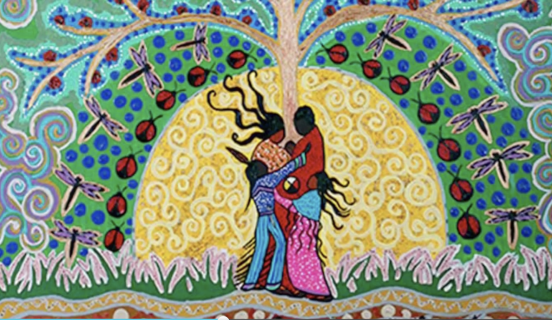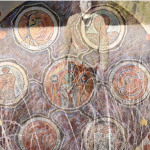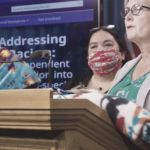Spoken Letters from Our Hearts: combined reflections from a Nuu-Cha-Nulth woman and a Kwawaka’wakw woman
We chose to collaborate our reflections to form solidarity. We are indigenous women who have chosen to pursue an education to help our communities make sense of colonization and reconciliation. While Cacinaas is from the Nuu-chah-nulth nation and K̓idiła̱me’ is from the Kwakwaka’wakw, our people have lived on Vancouver Island for thousands of years. We are honoured to have read the stories of the Mi’kmawey Survivors and to share our perspectives with both the survivors and the Canadian public.
Cacinaas: I wrote a poem that came straight from my heart. I wanted to highlight the struggles of the survivors but shine a brighter light on their resilience. The telling of their stories has opened up dialogue and understanding among my peers. They have done the most courageous thing by sharing with the world their experiences as we head down the road to reconciliation. I wanted these survivors to know they are making positive impacts in regard to indigenous relations. I also wanted this poem to show that my generation is watching and learning from the elders and recognizing our responsibilities to the future of our culture and languages. I really thought about the four women from my own tribe who are on an 8-month journey of language revitalization. They spend a lot of time in our traditional territory, so we have the opportunity to learn directly from our fluent elders. Then my friend Hinitinyis came to mind. She is part of her own Huu-ay-aht language revitalization. Every night she goes live on Facebook to read children’s stories in her native language. The millennials have awakened to our responsibilities, and that is very apparent in my ow life and communities
K̓idiła̱me’: While I am not a poetic person by any means, I initially struggled to write a poem that encompassed all my thoughts about the residential school survivors and reconciliation. However, I began to let the words flow on paper and created a short and sweet poem that attempted to not only honour the stories and experiences of the Mi’kmawey survivors, but also to honour all of residential school survivors, including my own ancestors. In addition, I wanted to acknowledge those who have passed on during their residential school experience by mentioning that their “spirits are still alive.” Overall, I wanted to make it known that I am aware of what the residential schools did to our people and that I will remember their stories. But most importantly, I wanted to thank the survivors for holding on to their languages, teachings and cultures despite all the abuse and trauma they faced as this strength and resilience has given their descendants an opportunity to practice these and therefore has allowed us to preserve and embrace our identities. Finally, I wanted to recognize the strength and bravery of the survivors as they have shared their stories and in doing so, have created a path towards achieving reconciliation.
Although we raise our hands to all the Mi’kmawey survivors, we chose to focus on three individuals whose stories had a big impact on us. To honour Andrew, we decided to “give” him our dedication to protecting our waters as water rights and protection is a passion of his. Being Indigenous and seeing the lack of access to clean water in many of our communities, this is a sensitive issue and one that’s close to our hearts. Protecting water, inquires into lack of access in remote communities in Canada and the valiant efforts of Standing Rock in North Dakota, has increased public awareness. We would like to contribute to this awareness and hope that during our life time, we will see access to clean water for all indigenous communities.
To honour Jake, we chose to “give” him a series of photos from the Longest Walk in 1978. As described in our presentation, his involvement in the final day of the Longest Walk, was one of Jake’s fondest memories and marks the day he began his journey on the Red Road. As a reminder of his success in overcoming his addiction and as a token of appreciation, we wanted to share a piece of one of his most memorable days. In addition, we have incorporated a “prayer to the creator” by Iyanla Vanzant as Jake’s connection to the creator has been his greatest sense of help and support along his journey.
To honour Jane, we decided to “give” her a quote that recognizes her achievement in graduating university with a Bachelor of Education Degree. Although Jane became angry and confused about her identity as a Mi’kmawey youth upon leaving the residential school, she still managed to regain her identity, set a good example for her children and “get revenge” on the residential school after pursing her education. As indigenous women who are working towards our education, Jane is an inspiration. In addition, we included a beautiful photo that demonstrates family, unity and growth as this is a symbol of Jane’s love to her children and dedication to promoting healthy parenting in indigenous communities.
As for something we could “give” to the general Canadian public, we decided to incorporate a couple of images and quotes into our presentation that work generate a clearer understanding of indigenous peoples historical and contemporary struggles in this country. One photo conveys exactly what this is trying to say: “I believe that much trouble would be saved if we opened up our hearts more.” In addition, we incorporated images that depict the importance of listening, witnessing, sharing and owning our histories because these go hand in hand with opening our minds and hearts to one another. Sharing our narratives can only be effective when there is a genuine and open-minded listener. In addition, we are contributing to not only indigenous peoples and communities, but also to the Canadian public, as we embark on our journey into social work. As insiders, we are dedicated to our career paths and are passionate in helping and healing our communities. Not only will we strive to work our people, but we will work to foster relationships with non-Indigenous people and professionals to generate a mutual understanding and to meaningful facilitate change.
Overall, the spoken letters assignment was an emotional, yet empowering experience for the both of us. While we feel the intergenerational impacts of the trauma experienced in residential school by our ancestors, we were touched by the narratives of the Mi’kmawey survivors and were sensitive to the content of this assignment. Although the material was heavy, we are thankful to have each other through this process and to be reminded of the strength of our people. Not only has this assignment reminded us of how residential school and colonial history has impacted indigenous people and communities, but it has also given us an opportunity to reflect on why we chose this career path. Finally, the spoken letters assignment has shown us how we can contribute to and move forward on the path of reconciliation. We strongly believe that although this is a long and difficult process, it can be achieved through constant collaboration and communication between indigenous and non-indigenous people. As we walk on this journey together, we can build a positive and healthy future.






Dorene Bernard
December 6, 2018 — 5:36 am
This tribute to the Mi’kmaq IRS Suvivors is beautiful and honouring. I’m overwhelmed with pride and love for all who have come forward to share their legacy with us, for their courage, resilience and strength. I had the priviledge of working with them on the IRS Legacy project and know they will appreciate that your class has learned what they wanted to share and teach. Wela’lin for your beautiful Letters from the Heart. I will share with them and their families.